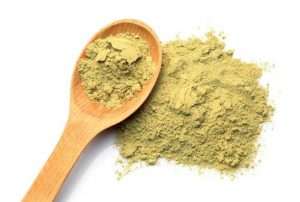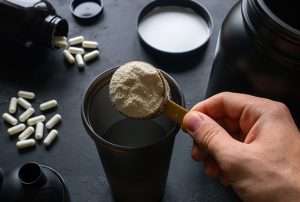PLANT PROTEINS ARE CLINICALLY PROVEN (TO OUTWEIGH WHEY!)
WHEY PROTEIN IS POPULAR BUT IT MAY NOT BE THE BEST FOR YOU.. BUT THERE’S AN ALTERNATIVE THAT’S JUST AS EFFECTIVE
If you’re taking a protein powder to help build muscle, support health or are at least considering it as an option you need to ask yourself the question – which source? Whey may be the most popular, accessible and cheap protein.. but is it the healthiest?
1. CLINICAL STUDY PROVES THAT YOU CAN BUILD MUSCLE AS EFFECTIVELY WITH PLANT-BASED PROTEINS
To find out how, let’s have a look at a clinical study that suggests that plant-based protein is just as effective as whey to build muscle.
The Study:
The clinical study titled “Pea proteins oral supplementation promotes muscle thickness gains during resistance training: a double-blind, randomized, Placebo-controlled clinical trial vs. Whey protein” compares the impact with 161 men between the ages of 18 to 35.
As part of the study, the participants had to undergo 12 weeks of resistance training on upper limb muscles (biceps). The participants were divided into 3 groups – Pea protein users, Whey protein users and a placebo group (control).
Each group was instructed to have an intake of 25 grams of protein twice per day (total 50 grams per day) during the 12-week control period.
The study was evaluated by performing tests on the muscle thickness and strength over three intervals – before the training program, six weeks into training, and after the training period was over. Muscle thickness was evaluated using ultrasonography and strength was also measured.
2. PEA PROTEIN USERS AND WHEY USERS DISPLAYED AN IDENTICAL GROWTH IN MUSCLE THICKNESS.
The Results:
Shocking! After the 12 week period, all three groups showed a consistent increase in muscle thickness and muscle strength.
However, further observations were:
- The group supplementing with pea protein showed significantly greater bicep thickness compared to the placebo group. Compared to the group supplementing with whey protein, there was no significant difference either.
Excerpts:
“Increases in thickness were significantly greater in the Pea group as compared to Placebo whereas there was no difference between Whey and the two other conditions. Muscle strength also increased with time with no statistical difference between groups.”
In all three groups, the maximum increase in muscle thickness occurred during the first six weeks. This suggests that in order to sustain an increase in muscle thickness, protein is important to maintain a positive protein balance (protein synthesised for new muscle growth vs protein degeneration as a result of training).
Furthermore, studies show that protein synthesis is 20% higher after ingestion of the amino acid leucine (abundantly found in pea protein).
3. CLINICAL TRIALS PROVE THAT THERE WAS NO STATISTICAL DIFFERENCE BETWEEN PEA AND WHEY USERS.
It has been established in the previous section that plant protein is just as effective as whey when it comes to building muscle.
However, an added but crucial bonus with plant-based options is that it eliminates all of the side effects on the body that are associated with the consumption of dairy-based products like whey.
4. PLANT PROTEIN HAS SEVERAL OTHER ADDITIONAL BENEFITS OVER WHEY
Here’s some of the significant advantages of consuming plant protein over whey:
ZERO INFLAMMATION: Plant-based proteins are dairy-free and gluten-free. This ensures that it does not cause inflammation in the body that a dairy-based whey protein can.
ZERO BLOATING: Most of whey protein’s side effects are related to digestion. Some people have trouble digesting it and experience problems like bloating, gas, stomach cramps and diarrhea. None of these side effects occur when you opt for a plant protein.
ZERO ACNE: One of whey protein’s other popular side effects is acne breakouts. Milk hormones and whey protein increase sebum production of the skin follicles which leads to acne. People suffering from acne are often advised to stop consuming whey protein altogether and opt for a rice or pea protein.
5. PLANT PROTEINS ABUNDANT BENEFITS MAKE IT AN EXCELLENT ALTERNATIVE TO WHEY
So whether you’re a vegan and want assurance that supplementing with vegan protein has the same effect as with whey or if you’re looking to ditch whey in favour of plant-based options, the science speaks for itself..
TRY OLENA’S PLANT PROTEIN POWDERS NOW!
Plant-based proteins, when used in adequate dosages (50 grams per day) statistically have the same effect on muscle thickness and strength as does whey protein supplements.
Which implies that if you are an athlete, sportsperson, a gym goer or a fitness enthusiast, you can easily replace your whey protein with a plant-based alternative for clinically-proven muscle gains.
Among other significant benefits, plant proteins are ideal for people with food sensitivities because it is free of allergens and the side effects that come with dairy-based whey.
So the next time you’re looking to purchase a protein powder, feel empowered by opting for a plant-based protein powder.
Clinical Study Reference:
Pea proteins oral supplementation promotes muscle thickness gains during resistance training: a double-blind, randomized, Placebo-controlled clinical trial vs. Whey protein
















